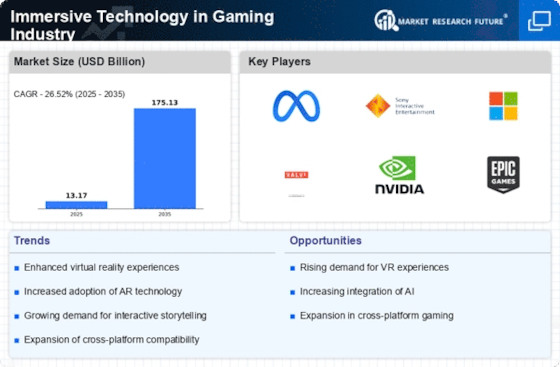-
Executive summary
-
Market Introduction
-
Definition
-
Scope of the Study
- Research Objective
- Assumptions
- Limitations
-
Research Methodology
-
Overview
-
Data Mining
-
Secondary Research
-
Primary Research
- Primary Interviews and Information Gathering Process
- Breakdown of Primary Respondents
-
Forecasting Modality
-
Market Size Estimation
- Bottom-Up Approach
- Top-Down Approach
-
Data Triangulation
-
Validation
-
Market Dynamics
-
Overview
-
Drivers
-
Restraints
-
Opportunities
-
Market Factor Analysis
-
Value Chain Analysis
-
Porter’s Five Forces Analysis
- Bargaining Power of Suppliers
- Bargaining Power of Buyers
- Threat of New Entrants
- Threat of Substitutes
- Intensity of Rivalry
-
COVID-19 Impact Analysis
- Market Impact Analysis
- Regional Impact
- Opportunity and Threat Analysis
-
Immersive Technology in Gaming Industry Market, BY Component
-
Overview
-
Hardware
- Head-Mounted Display (HMD)
- Gesture Tracking Devices (GTD)
- Projectors & Display Walls (PDW)
-
Software/Platform
-
Services
- Professional
- Managed
-
Immersive Technology in Gaming Industry Market, BY Technology
-
Overview
-
Mixed Reality (MR)
-
Virtual Reality (VR)
-
Augmented Reality (AR)
-
360 Film
-
Immersive Technology in Gaming Industry Market, BY Application
-
Overview
-
Training & Learning
-
Emergency Services
-
Product Development
-
Sales & Marketing
-
Immersive Technology in Gaming Industry Market, by Region
-
Overview
-
North America
- U.S.
- Canada
-
Europe
- Germany
- France
- U.K
- Italy
- Spain
- Rest of Europe
-
Asia-Pacific
- China
- India
- Japan
- South Korea
- Australia
- Rest of Asia-Pacific
-
Rest of the World
- Middle East
- Africa
- Latin America
-
Competitive Landscape
-
Overview
-
Competitive Analysis
-
Market Share Analysis
-
Major Growth Strategy in the Global Immersive Technology in Gaming Industry Market,
-
Competitive Benchmarking
-
Leading Players in Terms of Number of Developments in the Global Immersive Technology in Gaming Industry Market,
-
Key developments and Growth Strategies
- New Component Launch/Technology Application
- Merger & Acquisitions
- Joint Ventures
-
Major Players Financial Matrix
- Sales & Operating Income, 2022
- Major Players R&D Expenditure. 2022
-
Company ProfileS
-
ACER INC.
- Company Overview
- Financial Overview
- Product Offered
- Key Developments
- SWOT Analysis
- Key Strategies
-
Atheer, Inc.
- Company Overview
- Financial Overview
- Product Offered
- Key Developments
- SWOT Analysis
- Key Strategies
-
AVEVA Group PLC
- Company Overview
- Financial Overview
- Product Offered
- Key Developments
- SWOT Analysis
- Key Strategies
-
Barco NV
- Company Overview
- Financial Overview
- Product Offered
- Key Developments
- SWOT Analysis
- Key Strategies
-
Blippar Ltd.
- Company Overview
- Financial Overview
- Product Offered
- Key Developments
- SWOT Analysis
- Key Strategies
-
Carl Zeiss AG
- Company Overview
- Financial Overview
- Product Offered
- Key Developments
- SWOT Analysis
- Key Strategies
-
CM Labs Simulations Inc.
- Company Overview
- Financial Overview
- Product Offered
- Key Developments
- SWOT Analysis
- Key Strategies
-
EON Reality, Inc.
- Company Overview
- Financial Overview
- Product Offered
- Key Developments
- SWOT Analysis
- Key Strategies
-
FAAC Incorporated
- Company Overview
- Financial Overview
- Product Offered
- Key Developments
- SWOT Analysis
- Key Strategies
-
Google, LLC
- Company Overview
- Financial Overview
- Product Offered
- Key Developments
- SWOT Analysis
- Key Strategies
-
HCL Technologies Limited
- Company Overview
- Financial Overview
- Product Offered
- Key Developments
- SWOT Analysis
- Key Strategies
-
Honeywell International, Inc.
- Company Overview
- Financial Overview
- Product Offered
- Key Developments
- SWOT Analysis
- Key Strategies
-
HTC Corporation
- Company Overview
- Financial Overview
- Product Offered
- Key Developments
- SWOT Analysis
- Key Strategies
-
Immersive Media Company
- Company Overview
- Financial Overview
- Product Offered
- Key Developments
- SWOT Analysis
- Key Strategies
-
Immersive Technologies Pty Limited
- Company Overview
- Financial Overview
- Product Offered
- Key Developments
- SWOT Analysis
- Key Strategies
-
Lockheed Martin Corporation
- Company Overview
- Financial Overview
- Product Offered
- Key Developments
- SWOT Analysis
- Key Strategies
-
Magic Leap, Inc.
- Company Overview
- Financial Overview
- Product Offered
- Key Developments
- SWOT Analysis
- Key Strategies
-
NCTech Limited
- Company Overview
- Financial Overview
- Product Offered
- Key Developments
- SWOT Analysis
- Key Strategies
-
Oculus (Facebook Technologies, LLC.)
- Company Overview
- Financial Overview
- Product Offered
- Key Developments
- SWOT Analysis
- Key Strategies
-
Samsung Group
- Company Overview
- Financial Overview
- Product Offered
- Key Developments
- SWOT Analysis
- Key Strategies
-
Sony Corporation
- Company Overview
- Financial Overview
- Product Offered
- Key Developments
- SWOT Analysis
- Key Strategies
-
Unity Software Inc.
- Company Overview
- Financial Overview
- Product Offered
- Key Developments
- SWOT Analysis
- Key Strategies
-
Varjo Technologies Oy
- Company Overview
- Financial Overview
- Product Offered
- Key Developments
- SWOT Analysis
- Key Strategies
-
VI-grade GmbH
- Company Overview
- Financial Overview
- Product Offered
- Key Developments
- SWOT Analysis
- Key Strategies
-
Zeality Inc.
- Company Overview
- Financial Overview
- Product Offered
- Key Developments
- SWOT Analysis
- Key Strategies
-
Appendix
-
References
-
Related Reports
-
LIST OF TABLES
-
Global Immersive Technology in Gaming Industry Market, Synopsis, 2018-2032
-
Global Immersive Technology in Gaming Industry Market, Estimates & Forecast, 2018-2032 (USD BILLION)
-
Immersive Technology in Gaming Industry Market, BY Component, 2018-2032 (USD BILLION)
-
Immersive Technology in Gaming Industry Market, BY TECHNOLOGY, 2018-2032 (USD BILLION)
-
Immersive Technology in Gaming Industry Market, BY APPLICATION, 2018-2032 (USD BILLION)
-
Immersive Technology in Gaming Industry Market, BY Component, 2018-2032 (USD BILLION)
-
Immersive Technology in Gaming Industry Market, BY TECHNOLOGY, 2018-2032 (USD BILLION)
-
Immersive Technology in Gaming Industry Market, BY APPLICATION, 2018-2032 (USD BILLION)
-
Immersive Technology in Gaming Industry Market, BY Country, 2018-2032 (USD BILLION)
-
U.S. Immersive Technology in Gaming Industry Market, BY Component, 2018-2032 (USD BILLION)
-
U.S. Immersive Technology in Gaming Industry Market, BY TECHNOLOGY, 2018-2032 (USD BILLION)
-
U.S. Immersive Technology in Gaming Industry Market, BY APPLICATION, 2018-2032 (USD BILLION)
-
Immersive Technology in Gaming Industry Market, BY Component, 2018-2032 (USD BILLION)
-
Immersive Technology in Gaming Industry Market, BY TECHNOLOGY, 2018-2032 (USD BILLION)
-
Immersive Technology in Gaming Industry Market, BY APPLICATION, 2018-2032 (USD BILLION)
-
Immersive Technology in Gaming Industry Market, BY Component, 2018-2032 (USD BILLION)
-
Immersive Technology in Gaming Industry Market, BY TECHNOLOGY, 2018-2032 (USD BILLION)
-
Immersive Technology in Gaming Industry Market, BY APPLICATION, 2018-2032 (USD BILLION)
-
Immersive Technology in Gaming Industry Market, BY Country, 2018-2032 (USD BILLION)
-
Immersive Technology in Gaming Industry Market, BY Component, 2018-2032 (USD BILLION)
-
Immersive Technology in Gaming Industry Market, BY TECHNOLOGY, 2018-2032 (USD BILLION)
-
Immersive Technology in Gaming Industry Market, BY APPLICATION, 2018-2032 (USD BILLION)
-
Immersive Technology in Gaming Industry Market, BY Component, 2018-2032 (USD BILLION)
-
Immersive Technology in Gaming Industry Market, BY TECHNOLOGY, 2018-2032 (USD BILLION)
-
Immersive Technology in Gaming Industry Market, BY APPLICATION, 2018-2032 (USD BILLION)
-
Immersive Technology in Gaming Industry Market, BY Component, 2018-2032 (USD BILLION)
-
Immersive Technology in Gaming Industry Market, BY TECHNOLOGY, 2018-2032 (USD BILLION)
-
Immersive Technology in Gaming Industry Market, BY APPLICATION, 2018-2032 (USD BILLION)
-
Immersive Technology in Gaming Industry Market, BY Component, 2018-2032 (USD BILLION)
-
Immersive Technology in Gaming Industry Market, BY TECHNOLOGY, 2018-2032 (USD BILLION)
-
Immersive Technology in Gaming Industry Market, BY APPLICATION, 2018-2032 (USD BILLION)
-
U.Immersive Technology in Gaming Industry Market, BY Component, 2018-2032 (USD BILLION)
-
U.Immersive Technology in Gaming Industry Market, BY TECHNOLOGY, 2018-2032 (USD BILLION)
-
U.Immersive Technology in Gaming Industry Market, BY APPLICATION, 2018-2032 (USD BILLION)
-
Immersive Technology in Gaming Industry Market, BY Component, 2018-2032 (USD BILLION)
-
Immersive Technology in Gaming Industry Market, BY TECHNOLOGY, 2018-2032 (USD BILLION)
-
Immersive Technology in Gaming Industry Market, BY APPLICATION, 2018-2032 (USD BILLION)
-
Immersive Technology in Gaming Industry Market, BY Component, 2018-2032 (USD BILLION)
-
Immersive Technology in Gaming Industry Market, BY TECHNOLOGY, 2018-2032 (USD BILLION)
-
Immersive Technology in Gaming Industry Market, BY APPLICATION, 2018-2032 (USD BILLION)
-
Immersive Technology in Gaming Industry Market, BY Country, 2018-2032 (USD BILLION)
-
Immersive Technology in Gaming Industry Market, BY Component, 2018-2032 (USD BILLION)
-
Immersive Technology in Gaming Industry Market, BY TECHNOLOGY, 2018-2032 (USD BILLION)
-
Immersive Technology in Gaming Industry Market, BY APPLICATION, 2018-2032 (USD BILLION)
-
Immersive Technology in Gaming Industry Market, BY Component, 2018-2032 (USD BILLION)
-
Immersive Technology in Gaming Industry Market, BY TECHNOLOGY, 2018-2032 (USD BILLION)
-
Immersive Technology in Gaming Industry Market, BY APPLICATION, 2018-2032 (USD BILLION)
-
Immersive Technology in Gaming Industry Market, BY Component, 2018-2032 (USD BILLION)
-
Immersive Technology in Gaming Industry Market, BY TECHNOLOGY, 2018-2032 (USD BILLION)
-
Immersive Technology in Gaming Industry Market, BY APPLICATION, 2018-2032 (USD BILLION)
-
Immersive Technology in Gaming Industry Market, BY Component, 2018-2032 (USD BILLION)
-
Immersive Technology in Gaming Industry Market, BY TECHNOLOGY, 2018-2032 (USD BILLION)
-
Immersive Technology in Gaming Industry Market, BY APPLICATION, 2018-2032 (USD BILLION)
-
Immersive Technology in Gaming Industry Market, BY Component, 2018-2032 (USD BILLION)
-
Immersive Technology in Gaming Industry Market, BY TECHNOLOGY, 2018-2032 (USD BILLION)
-
Immersive Technology in Gaming Industry Market, BY APPLICATION, 2018-2032 (USD BILLION)
-
Immersive Technology in Gaming Industry Market, BY Component, 2018-2032 (USD BILLION)
-
Immersive Technology in Gaming Industry Market, BY TECHNOLOGY, 2018-2032 (USD BILLION)
-
Immersive Technology in Gaming Industry Market, BY APPLICATION, 2018-2032 (USD BILLION)
-
Immersive Technology in Gaming Industry Market, BY Component, 2018-2032 (USD BILLION)
-
Immersive Technology in Gaming Industry Market, BY TECHNOLOGY, 2018-2032 (USD BILLION)
-
Immersive Technology in Gaming Industry Market, BY APPLICATION, 2018-2032 (USD BILLION)
-
Immersive Technology in Gaming Industry Market, BY Country, 2018-2032 (USD BILLION)
-
Immersive Technology in Gaming Industry Market, BY Component, 2018-2032 (USD BILLION)
-
Immersive Technology in Gaming Industry Market, BY TECHNOLOGY, 2018-2032 (USD BILLION)
-
Immersive Technology in Gaming Industry Market, BY APPLICATION, 2018-2032 (USD BILLION)
-
Immersive Technology in Gaming Industry Market, BY Component, 2018-2032 (USD BILLION)
-
Immersive Technology in Gaming Industry Market, BY TECHNOLOGY, 2018-2032 (USD BILLION)
-
Immersive Technology in Gaming Industry Market, BY APPLICATION, 2018-2032 (USD BILLION)
-
Immersive Technology in Gaming Industry Market, BY Component, 2018-2032 (USD BILLION)
-
Immersive Technology in Gaming Industry Market, BY TECHNOLOGY, 2018-2032 (USD BILLION)
-
Immersive Technology in Gaming Industry Market, BY APPLICATION, 2018-2032 (USD BILLION)
-
LIST OF FIGURES
-
Research Process
-
Market Structure for the Global Immersive Technology in Gaming Industry Market
-
Market Dynamics for the Global Immersive Technology in Gaming Industry Market
-
Global Immersive Technology in Gaming Industry Market, Share (%), BY Component, 2022
-
Global Immersive Technology in Gaming Industry Market, Share (%), BY TECHNOLOGY, 2022
-
Global Immersive Technology in Gaming Industry Market, Share (%), BY APPLICATION, 2022
-
Global Immersive Technology in Gaming Industry Market, Share (%), by Region, 2022
-
north AMERICA: Immersive Technology in Gaming Industry MARKET, SHARE (%), BY REGION, 2022
-
Europe: Immersive Technology in Gaming Industry MARKET, SHARE (%), BY REGION, 2022
-
Asia-Pacific: Immersive Technology in Gaming Industry MARKET, SHARE (%), BY REGION, 2022
-
Rest of the world: Immersive Technology in Gaming Industry MARKET, SHARE (%), BY REGION, 2022
-
Global Immersive Technology in Gaming Industry Market: Company Share Analysis, 2022 (%)
-
ACER INC.: FINANCIAL OVERVIEW SNAPSHOT
-
ACER INC.: SWOT ANALYSIS
-
Atheer, Inc.: FINANCIAL OVERVIEW SNAPSHOT
-
Atheer, Inc., Inc.: SWOT ANALYSIS
-
AVEVA Group PLC.: FINANCIAL OVERVIEW SNAPSHOT
-
AVEVA Group PLC: SWOT ANALYSIS
-
Barco NV: FINANCIAL OVERVIEW SNAPSHOT
-
Barco NV: SWOT ANALYSIS
-
Blippar Ltd.: FINANCIAL OVERVIEW SNAPSHOT
-
Blippar Ltd.: SWOT ANALYSIS
-
Carl Zeiss AG: FINANCIAL OVERVIEW SNAPSHOT
-
Carl Zeiss AG: SWOT ANALYSIS
-
CM Labs Simulations Inc.: FINANCIAL OVERVIEW SNAPSHOT
-
CM Labs Simulations Inc.: SWOT ANALYSIS
-
EON Reality, Inc.: FINANCIAL OVERVIEW SNAPSHOT
-
EON Reality, Inc.: SWOT ANALYSIS
-
FAAC Incorporated: FINANCIAL OVERVIEW SNAPSHOT
-
FAAC Incorporated: SWOT ANALYSIS
-
Google, LLC: FINANCIAL OVERVIEW SNAPSHOT
-
Google, LLC.: SWOT ANALYSIS
-
HCL Technologies Limited: FINANCIAL OVERVIEW SNAPSHOT
-
HCL Technologies Limited: SWOT ANALYSIS
-
Honeywell International, Inc.: FINANCIAL OVERVIEW SNAPSHOT
-
Honeywell International, Inc.: SWOT ANALYSIS
-
HTC Corporation: FINANCIAL OVERVIEW SNAPSHOT
-
HTC Corporation: SWOT ANALYSIS
-
Immersive Media Company: FINANCIAL OVERVIEW SNAPSHOT
-
Immersive Media Company.: SWOT ANALYSIS
-
Immersive Technologies Pty Limited: FINANCIAL OVERVIEW SNAPSHOT
-
Immersive Technologies Pty Limited, LLC: SWOT ANALYSIS
-
Lockheed Martin Corporation: FINANCIAL OVERVIEW SNAPSHOT
-
Lockheed Martin Corporation: SWOT ANALYSIS
-
NCTech Limited: FINANCIAL OVERVIEW SNAPSHOT
-
NCTech Limited: SWOT ANALYSIS
-
Oculus (Facebook Technologies, LLC.): FINANCIAL OVERVIEW SNAPSHOT
-
Oculus (Facebook Technologies, LLC.): SWOT ANALYSIS
-
Samsung Group: FINANCIAL OVERVIEW SNAPSHOT
-
Samsung Group: SWOT ANALYSIS
-
Sony Corporation: FINANCIAL OVERVIEW SNAPSHOT
-
Sony Corporation: SWOT ANALYSIS
-
Unity Software Inc.: FINANCIAL OVERVIEW SNAPSHOT
-
Unity Software Inc.: SWOT ANALYSIS
-
Varjo Technologies Oy: FINANCIAL OVERVIEW SNAPSHOT
-
Varjo Technologies Oy: SWOT ANALYSIS
-
VI-grade GmbH: FINANCIAL OVERVIEW SNAPSHOT
-
VI-grade GmbH: SWOT ANALYSIS
-
VI-grade GmbH: FINANCIAL OVERVIEW SNAPSHOT
-
VI-grade GmbH: SWOT ANALYSIS



















Leave a Comment